 Petzlover
Petzlover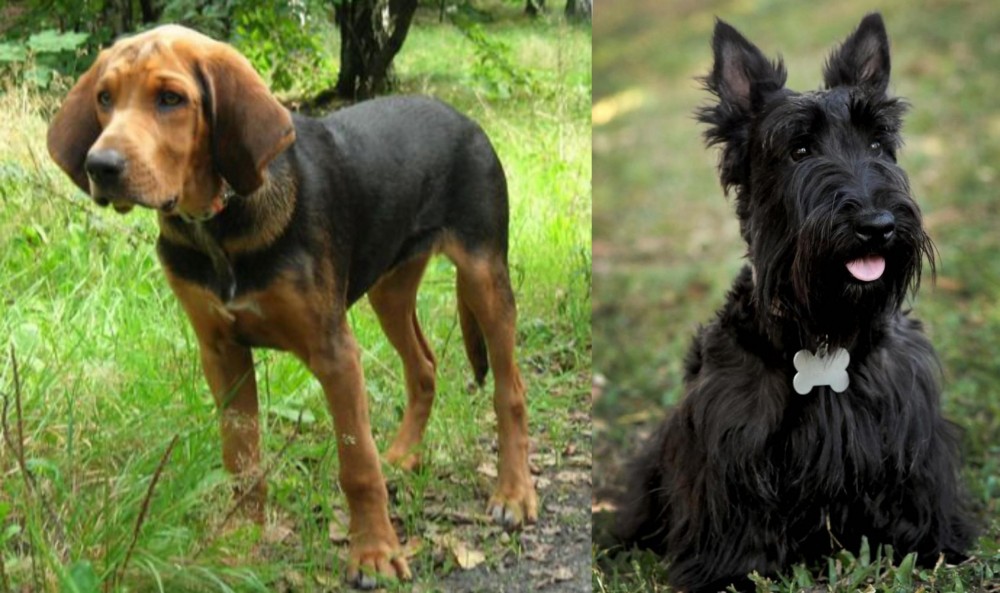 Polish Hound is originated from Poland but Scoland Terrier is originated from United Kingdom. Polish Hound may grow 38 cm / 15 inches higher than Scoland Terrier. Polish Hound may weigh 22 kg / 49 pounds more than Scoland Terrier. Both Polish Hound and Scoland Terrier has almost same life span. Polish Hound may have more litter size than Scoland Terrier. Polish Hound requires Moderate Maintenance. But Scoland Terrier requires High Maintenance
Polish Hound is originated from Poland but Scoland Terrier is originated from United Kingdom. Polish Hound may grow 38 cm / 15 inches higher than Scoland Terrier. Polish Hound may weigh 22 kg / 49 pounds more than Scoland Terrier. Both Polish Hound and Scoland Terrier has almost same life span. Polish Hound may have more litter size than Scoland Terrier. Polish Hound requires Moderate Maintenance. But Scoland Terrier requires High Maintenance
 It is thought that Polish Hounds descended from the Kostroma Hound. Other experts believe that the dogs were developed through crossbreeding of Bloodhounds with local Polish hounds.
It is thought that Polish Hounds descended from the Kostroma Hound. Other experts believe that the dogs were developed through crossbreeding of Bloodhounds with local Polish hounds.
The idea was to get a more lighter-boned, more athletic Bloodhound type of dog. In fact, this new standard was adopted in 1983 as the guide for the ideal Polish Hound.
The World Wars caused the numbers of these dogs to be drastically reduced, and attempts were made to revive the breed. The dog is rare outside his native country.
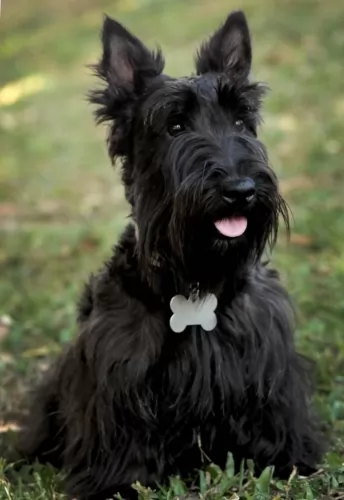 Not much is known about the Scoland Terrier. It is not a purebred but rather a crossbreed developed by crossing the Scottish Terrier with the Westland Terrier. To understand these mixed breeds, look to the original breeds for any combination of the characteristics of the breeds. The offspring of this crossing is not a 50-50 split of the original breeds looks or temperament.
Not much is known about the Scoland Terrier. It is not a purebred but rather a crossbreed developed by crossing the Scottish Terrier with the Westland Terrier. To understand these mixed breeds, look to the original breeds for any combination of the characteristics of the breeds. The offspring of this crossing is not a 50-50 split of the original breeds looks or temperament.
Because the Scoland Terrier is a mix between the Scottie and the Westie he has all the characteristics of a typical terrier perhaps even twice as much. With both parents being terriers, you can expect your Scoland to act like a short legged terrier. These dogs are known for their courage and tenacity. Today these terriers are family companions. Most terriers today come from a pool of ancestral dog in the 19th century in Europe. This information was gleaned from a genetic analysis done in 2006.
The Scoland Terrier, being a hybrid, is not acknowledged by the American Kennel Club (AKC) or the United Kennel Club (UKC). It is acknowledged by the International Designer Canine Registry (IDCR), American Canine Hybrid Club (ACHC), Dog Registry of America, Inc. (DRA), Designer Dogs Kennel Club (DDKC) and Designer Breed Registry (DBR).
 The Polish Hound is a nice, big, solid looking dog. He stands at between 55–65 cm in height and weighs between 20 to 32kg, both male and female. If you were to try and think of him, you could think of a Labrador/Beagle/Bloodhound mix.
The Polish Hound is a nice, big, solid looking dog. He stands at between 55–65 cm in height and weighs between 20 to 32kg, both male and female. If you were to try and think of him, you could think of a Labrador/Beagle/Bloodhound mix.
He is a medium to large sized dog. The coat is short to medium in length and is thick and hard with a soft, dense undercoat. The color of the coat is brown and tan and black and tan. The dog’s tail is set low and is thick and long.
This dog is a wonderful dog known to be clever and eager to please. He also has other attractive characteristics such as being energetic, gentle and he has an urge to protect his human family.
He is also loved because he is reliable and gentle around children who know how to treat dogs with respect. Some people who have owed this dog say that there is just one small fault – the dog’s bark – it is deep and mellow – and its why he isn’t suited to life in the city.
He is a rural dog, loving wide open spaces. It is why the dog will be an excellent pet if he is trained and socialized, becoming obedient and well balanced.
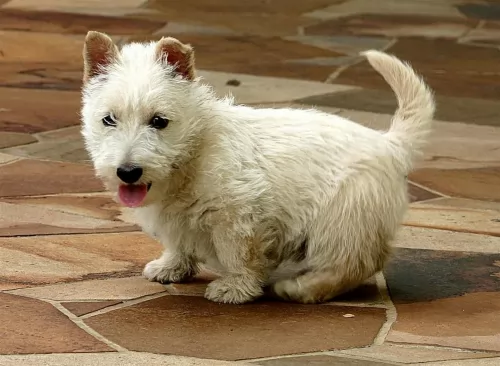 Being a hybrid, the Scoland Terrier will not always look alike and could look like a Scottie, a Westie or a combination of the two. Most breeders of this designer dog say it usually has a body like the Scottie and a round head like the Westie. They are more often black with white markings, but they can often be wheaten as well. With round dark eyes, a scissors bite and black nose, her face is unique. The breed has erect and small, triangular ears and a medium fluffy tale. The coat is hard and wiry, with a dense soft undercoat.
Being a hybrid, the Scoland Terrier will not always look alike and could look like a Scottie, a Westie or a combination of the two. Most breeders of this designer dog say it usually has a body like the Scottie and a round head like the Westie. They are more often black with white markings, but they can often be wheaten as well. With round dark eyes, a scissors bite and black nose, her face is unique. The breed has erect and small, triangular ears and a medium fluffy tale. The coat is hard and wiry, with a dense soft undercoat.
 As a family pet, the Polish Hound just loves his human family, particularly when they are outdoor, active types. Your Polish Hound just loves spending time with his human family.
As a family pet, the Polish Hound just loves his human family, particularly when they are outdoor, active types. Your Polish Hound just loves spending time with his human family.
This is a wonderful dog as a family pet. More so when he has been trained and socialized. In exchange for the the wonderful companionship this dog offers you, you owe it to him to keep him happy and content.
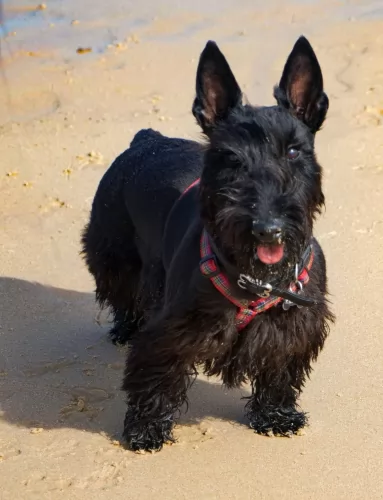 1.Children friendliness - they can be very good with children and children can help them get their exercise.
1.Children friendliness - they can be very good with children and children can help them get their exercise.
3.Adaptability - yes but she is adept at digging and must have a safe enclosure.
 The Polish Hound has a reputation for good health. That doesn’t mean you can just leave your pet. Good preventative healthcare is still vital if you want to prevent your pet being attacked by fleas, ticks, worms and mosquitoes.
The Polish Hound has a reputation for good health. That doesn’t mean you can just leave your pet. Good preventative healthcare is still vital if you want to prevent your pet being attacked by fleas, ticks, worms and mosquitoes.
You need to be careful with the Polish Hound because it's a deep chested dog, and these kinds of dogs are more prone to bloat. This is a deadly disease when the stomach twists and gas can’t escape. Untreated, bloat can be a killer. Take immediate action when you see your dog with a swollen stomach, restlessness and drooling.
 This hybrid dog can inherit any of the issues faced by its two parent breeds. For the Scoland Terrier this can include:
This hybrid dog can inherit any of the issues faced by its two parent breeds. For the Scoland Terrier this can include:
• Seborrhea – Skin disease that can cause dogs to scratch until bleeding and/or infected.
• Carniomandibular Osteopathy -called lion’s jaw this is a developmental disease that causes extensive changes in the bones of the mandible and skull.
• Pulmonic Stenosis – when the blood flowing from the heart’s right ventricul to the pulmonary artery is blocked.
• PPM or Persistent Pupillary Membranes - causes visual impairment when the membranes do not dissolve after birth.
• Chronic Hepatitis – disease of the liver that can eventually cause major damage.
 As a working dog, the Polish Hound is used to being busy and will be relying on you for a good dose of exercise. He loves the chance of a walk or a run and will be happy to run alongside you while you cycle or jog. Don’t forget ball games too.
As a working dog, the Polish Hound is used to being busy and will be relying on you for a good dose of exercise. He loves the chance of a walk or a run and will be happy to run alongside you while you cycle or jog. Don’t forget ball games too.
The thick coat of the dog will need to be brushed twice a week to remove all that loose hairs. He is a moderate shedder so the coat becomes dull if not regularly brushed.
During the brushing session, check your dog over for fleas and ticks, and any odd lumps that weren’t there before. Trim your pets nails if they don’t wear down naturally. This is a floppy eared breed, so you will need to check the inside of his ears for dirt, wax and bacteria.
Pay close attention to your dog’s teeth.Bad teeth can cause a lot of pain but also be very detrimental to your dog’s health.
Just like humans, dogs rely on quality food for good health and longevity. There are many good commercially manufactured dog foods, but avoid the ones with low quality ingredients as these can make your dog ill.
Check the ingredients-list carefully so that you can be sure your pet is getting the right balances of vitamins and minerals. Home-made food is also important as it is nutritious and tasty. You can add it into the dry kibble as a treat sometimes. The simpler the better as dogs don’t like spicy, exotic foods.
Boiled chicken, brown rice or pasta, sweet potatoes, spinach and carrot can be chopped up and given to your pet. Also try and include some raw meat as this is beneficial for health. Fresh, cool water must be made constantly available.
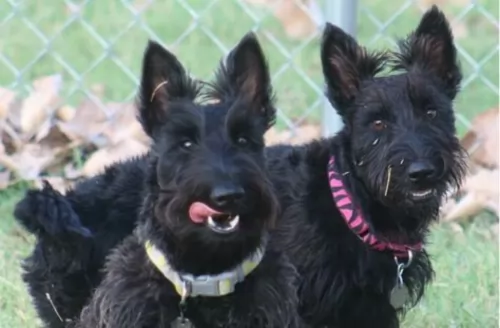 1.Feeding the puppy - Give a high quality puppy dog food designed for terriers or active medium sized dogs. Give ¾ of a cup over 3 meals a day.
1.Feeding the puppy - Give a high quality puppy dog food designed for terriers or active medium sized dogs. Give ¾ of a cup over 3 meals a day.
2.Feeding the adult – Give a high quality adult dog food designed for terriers or active medium sized dogs. Give one cup over two meals a day.
4. Games and Exercises – The Scoland Terrier is a very active dog and needs daily exercise, He need time to play, run, and be stimulated by games. She would be very good at flyball, Frisbee, fetch, agility, barn hunt, and obedience. He needs at least 2 hours of play and exercise everyday.